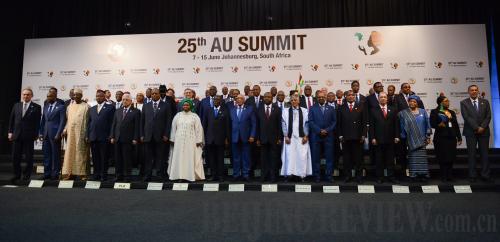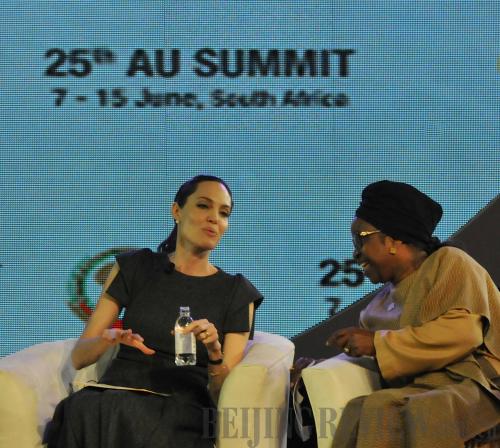|
 |
|
Heads of State and Government from 54 African Union (AU) members pose for a group photo before the openning ceremony of the 25th AU Summit on June 14 in Johannesburg, South Africa (XINHUA) |
A head of state escaping arrest, Hollywood glamor, and rambling presidential soliloquies. Not the setting of a movie, but the points for which the 25th African Union (AU) Summit, held in South Africa's Johannesburg from June 7 to 15, is likely to be remembered.
While leaders gathered to discuss pressing issues of peace and security, gender equality, and socioeconomic development, much of the media focus was on the presence of Sudanese President Omar al-Bashir--which created a political and legal backlash for the host country. Bashir, who is wanted by the International Criminal Court (ICC) for war crimes, crimes against humanity, and genocide committed from 2003 in Darfur, Sudan, was given immunity by the South African Government at the summit as a head of state on official business.
However, Anton du Plessis, Managing Director of the Johannesburg-based Institute for Security Studies, said the immunity argument does not hold up, "The United Nations Security Council decision in this case bars immunity to Bashir under international law and in relation to his position as head of state. Plus, South Africa's own ICC implementation law removes immunity for individuals wanted by the ICC."
The South African Government, as a signatory to the Rome Statute of the ICC--which says four core crimes, genocide, crimes against humanity, war crimes and the crime of aggression, shall not be subject to any statute of limitations --was legally obliged to arrest Bashir. Yet despite the South African Litigation Center, a Johannesburg-based rights advocacy group, asking the high court to order Bashir's arrest and prevent him from exiting the country, he left on a midnight flight before the summit's conclusion. This disregard for procedure has severely dented South Africa's proud international and domestic reputation regarding the rule of law.
Weighing in on the issue, AU Commission Chair Nkosazana Dlamini-Zuma defended the decision to invite Bashir. "Sudan is a member of the AU and has always attended AU summits," she said at the closing ceremony, adding the summit was an AU venue, not a South African one. AU Chair Zimbabwean President Robert Mugabe said African countries should withdraw from the ICC because it "unfairly targets African leaders."
Thirty-four African countries are states parties to the Rome Statute.
 |
|
Angelina Jolie (left), Actress and Special Envoy of UN High Commissioner for Refugees, and Bineta Diop, Special Envoy on Women, Peace and Security of the Chairperson of the AU Commission, share a joke before speaking on women's issues at the AU Summit (FRANCISCO LITTLE) |
Women's theme
Women were at the forefront of the summit's agenda. As the first woman to chair the AU Commission, Dlamini-Zuma raised women's empowerment as the focus of the summit, adopting the theme "women's empowerment for the realization of Agenda 2063." Agenda 2063 is the long-term development blueprint the AU committed itself to at its 50th anniversary in 2013.
Part of that commitment is to fully involve and engage women and youth. One of the women invited to speak at the summit was award-winning actor and Special Envoy of the UN High Commissioner for Refugees, Angelina Jolie. In the cavernous ballroom filled with African leaders she made an impassioned plea for implementing policies on sexual crimes for increased global support to end violence against women worldwide.
"We absolutely have to treat sexual assault with the gravity it deserves," said Jolie. "Violence against women is still treated as a lesser crime. Armed groups turn it into a weapon of choice because of near total impunity."
Addressing the men in the audience, Jolie said she was asking them as leaders to live up to their promises and beyond, "You, as men, can play a bigger role by arresting and prosecuting perpetrators, allocate funds for survivors of sexual violence and really help root out violence and discrimination in all forms."
A call was also made for both the public and private sector to invest in women. UN Women Executive Director Phumzile Mlambo-Ngcuka told media without this investment there could be no sustainable development in Africa. Mlambo-Ngcuka was especially concerned about early child marriage, noting that 15 of the 20 countries where this practice is unchecked are in Africa.
She said early marriage is a human rights violation and has devastating consequences. A girl married before 18 will probably not enjoy her right to education or health. "These are consequences that reverberate throughout a lifetime," said Mlambo-Ngcuka, emphasizing the need to have laws that prohibit child marriage, but more importantly, for the laws to be enforced.
Speaking for the most vulnerable of women, particularly those from war-torn nations, Dlamini-Zuma said unfortunately, women and children are the main victims of conflicts though they play no part in starting them. She said AU Peace and Security Council members, peacekeepers and mediators have pledged to "silence the guns" in conflict-ridden areas, such as Sudan's Darfur, Libya and South Sudan, within five years.
With a touch of sarcasm she prodded the male heads of state, saying "Agenda 2063 is about the people, [and] we cannot leave out half of the population. May I also remind all of us that women and youth form the majority of the voters?"
Africa's only female head of state, Liberian President Ellen Johnson Sirleaf, appealed for women to have access to land, without which they lack finances.
The outcomes
Away from the intricacies of Bashir's presence and the Jolie distraction, it was business as usual.
Funding and operations have long been a challenge for the AU. According to AU Administration and Human Resources Director Idriss Adoum, the organization employs around 1,500 full-time staff, with offices in 35 member countries and in Washington, New York, Geneva and Brussels. The AU's budget is around $430 million for 2015, of which $109 million is earmarked for salaries and other operational expenses. The balance goes toward peacekeeping and other programs. Ironically, the AU's member states fund the total operational budget, but less than 5 percent of the program's budget, which is paid for by the European Commission, World Bank and developed countries.
An agreement was reached to scale up financial contributions from member states. This will allow the AU to fund 100 percent of its operations, 75 percent of its programs and 25 percent of its peace and security activities.
Observers say peacekeeping funds are well spent as one of the AU's major success areas is its peace and security operations, where African troops are at the frontline of conflicts in Sudan, Burundi and Somalia. A decade ago, Western troops would have been involved.
It is the peace and security efforts that will ultimately allow Africans to move about freely on their own continent and not as refugees, as is the case now. This free flow of people and trade will bring about integration, something clearly inculcated in the timeline of the First 10-Year Implementation Plan Toward Agenda 2063.
In his closing address and report after a hectic two days of meetings, Mugabe said this plan would include a Continental Free Trade Area, a high-speed rail network, an African Center for Disease Control and Prevention, and a pan-African university. In addition, it was agreed to fast-track establish an African standby force for rapid deployment in conflict areas.
Peace concerns in Mali and Burundi were also high on the list of priorities. Mugabe said the signing and implementation of the Mali peace accord between rebels and the government will undermine terror groups in the region, while Burundi President Pierre Nkurunziza has been urged to step down after a constitutionally mandated two terms.
Mugabe urged the New Partnership for Africa's Development--an AU strategic framework for pan-African socioeconomic development--heads of state meeting on the sidelines of the summit to fast-track Africa's quest for industrialization and value addition of its vast mineral resources.
"Surely the African people cannot continue to be hewers of wood and drawers of water while others delight in their resources, [and] in our resources," he said.
(Reporting from Johannesburg, South Africa)
Copyedited by Sudeshna Sarkar
Comments to liuyunyun@bjreview.com | 